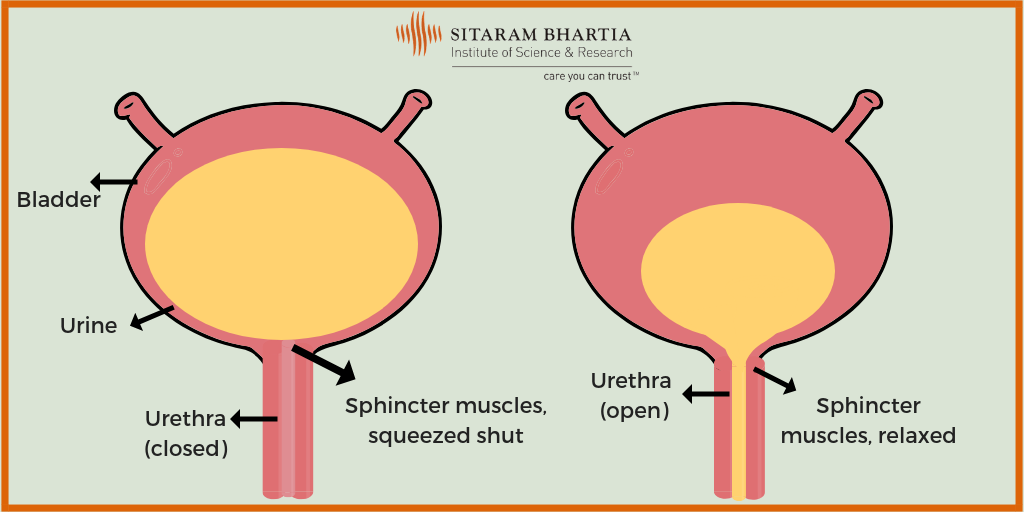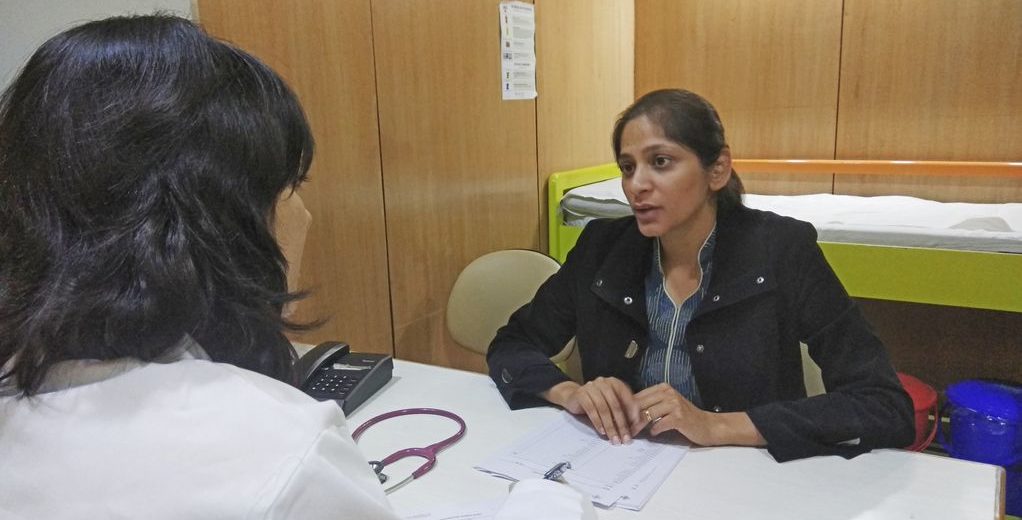Urinary incontinence is one problem that every woman experiences at least once in her lifetime. Women normally don’t seek treatment for the fear of embarrassment and due to a thought process passed on from elder women that it is a normal age-related change.
Nandita Shukla, 34, was going through the same dilemma after the birth of her second child.
“Not long after my delivery I started noticing that whenever I used to cough, sneeze or laugh loudly, some amount of urine always used to leak even when I tried so hard to control it,” said a distressed Nandita.
“I thought it will get alright on its own but instead of that, it became worse and this urine leakage started happening at inappropriate times leaving me embarrassed in front of other people.”
Unlike other women, Nandita knew it wasn’t normal and decided that she won’t let it go for the fear of embarrassment. She decided to consult Dr. Namrita Gurpal Singh Sandhu, Consultant, Obstetrics and Gynaecology at Sitaram Bhartia Hospital in Delhi.
Nandita discussed her urine problem with Dr. Namrita Gurpal Singh Sandhu describing all the symptoms she had been experiencing since her delivery.
After hearing about her condition, Dr. Namrita Gurpal Singh Sandhu knew Nandita was experiencing urinary incontinence but decided to examine her more.
Urinary Incontinence – How is it diagnosed?
Dr. Namrita Gurpal Singh Sandhu urged her to talk about her urine problem in detail by asking questions like how often did she leak urine especially while laughing or coughing, how many times did she have to pass urine in a day and how much alcohol or caffeine she consumed daily. Nandita also stressed the fact that the symptoms started occurring only after the birth of her second child.
Based on her symptoms, Dr. Namrita Gurpal Singh Sandhu suspected that what Nandita was having was stress incontinence. In order to be sure, she decided to perform a pelvic and vaginal examination to see if there was any prolapse.
She also asked Nandita to cough a few times to see if there was any urine leakage and if there was, how much urine leaked out each time.
After a complete examination, Nandita was diagnosed with stress incontinence.
“What does incontinence mean?” asked a confused Nandita on hearing the term.
What is Urinary Incontinence?
“Urinary incontinence is a condition in which a woman, for some reason, loses control of her bladder leading to frequent urination and urine leakage at inappropriate times. There are different types of urinary incontinence that one experiences,” said Dr. Namrita Gurpal Singh Sandhu.
It is a common urine problem in women, especially older women, but each can experience different symptoms depending on the type and severity of the incontinence. In stress incontinence, occasional urine leakage happens while coughing or laughing. In urge incontinence, one has sudden but strong urges to pass urine and may also leak while going to the washroom.
Nandita understood what it means and was curious to know its causes.
Urinary Incontinence causes – Why does it happen?
To answer this, Dr. Namrita Gurpal Singh Sandhu first explained her the whole process of passing urine. “When we start passing urine, the bladder muscles contract in order to force urine out of it and into the urethra which is the tube responsible for carrying urine out of the body. At the same time, the sphincter muscles surrounding the urethra relax to let urine pass through it.”

Urinary incontinence takes place when the bladder muscles become too weak to hold urine for long or contract at odd times generating a sudden need to pass urine. At times it is also caused when the sphincter muscles become too weak to hold back urine which leads to frequent leakages.
“It all depends on the type of incontinence but the main thing is that it occurs due to problems with the bladder muscles and nerves responsible for holding and releasing urine,” remarked Dr. Namrita Gurpal Singh Sandhu
But this urine problem is just a symptom. There is always an underlying condition causing this.
What conditions can cause incontinence?
“Temporary incontinence can be caused due to your everyday habits like drinking too much alcohol or coffee. The chances are more if you have constipation.” It can also be a sign of urine infection.
On the other hand, continuous urinary incontinence can be caused due to the following reasons:
- Pregnancy – During pregnancy, the baby puts pressure on the bladder. This pressure makes one want to urinate frequently. As the pregnancy progresses, a woman can start to leak urine often especially when she coughs or laughs. “Most women get relieved of these symptoms soon after delivery,” said Dr. Namrita Gurpal Singh Sandhu
- Childbirth – Childbirth may occasionally take a toll on your pelvic floor muscles which support the bladder. They may become weak and unable to hold the bladder in place. Due to this the bladder may start dropping down towards your vagina and the sphincter muscles aren’t able to hold back urine anymore. This leads to sudden leakages which is what Nandita was experiencing.
- Aging – As you age, your bladder muscles may lose the ability to store urine for longer periods of time leading to frequent urination. The sphincter muscles might also become lax leading to incontinence.
- Menopause – As soon as you are past menopause, there are chances that the estrogen levels in your body decrease. As estrogen helps make the bladder muscles strong, the lack of estrogen causes the bladder to drop down as the bladder muscles are no longer able to give it proper support. This leads to stress incontinence.
Types of Urinary Incontinence
There are three main types of incontinence that women experience at least once in their lifetimes:
- Stress incontinence – When you leak urine due to even slight pressure on the bladder, it is known as stress incontinence. “In this case, you might leak urine whenever you cough, sneeze, laugh or even exercise,” said Dr. Namrita Gurpal Singh Sandhu
- Urge incontinence – Urge incontinence is when you often experience a sudden, intense urge to urinate but end up leaking even before you reach the washroom. A common symptom is frequent urination which can happen throughout the night. “It is usually caused when bladder contracts at inappropriate times forcing you to pass urine anytime even when you are sleeping. An urge incontinence may also be commonly recognized as an overactive bladder.
- Overflow incontinence – This type of incontinence causes constant dribbling of urine due to an overfull bladder. “It happens when you simply aren’t able to empty your bladder in one go. It is a problem seen post surgery or in older women,” said Dr. Namrita Gurpal Singh Sandhu
“No matter which type of incontinence you are experiencing, it is very important to get it treated if it is frequent or affects your daily life and social interactions. Please don’t feel shy or embarrassed to seek help.”
Nandita was relieved that she hadn’t let her embarrassment stop her from seeking medical guidance for her urine problem. She began discussing various treatment options with the doctor.
What is the treatment for urinary incontinence?
Treatment for incontinence depends on the type of incontinence you are facing and the severity of its symptoms.
As Nandita was experiencing only mild symptoms of stress incontinence caused by childbirth, Dr. Namrita Gurpal Singh Sandhu suggested making some simple lifestyle changes in order to manage her symptoms.
“Increasing physical activity like doing pelvic floor exercises daily can do wonders in strengthening the pelvic floor muscles and reducing the symptoms of incontinence.”
Dr. Namrita Gurpal Singh Sandhu advised Nandita to do kegel exercises on a regular basis because it helps make the bladder muscles stronger, which would help control urination better. She also talked to Nandita about various behavioural techniques which will help her with her incontinence.
These include –
- Bladder control training – It is to improve your ability to hold off urination whenever you feel the urge to go. The main aim here is to increase the time between the trips to the washroom.
- Double voiding – This is a technique used to ensure that you empty your bladder completely before getting out of the washroom. In this, you urinate but wait for a few minutes before trying to pass urine again so that there’s no urine left in the bladder.
- Fluid and diet management – This technique encourages you to avoid things like caffeine, alcohol and acidic foods which can increase urine production.
“Weight loss can also reduce the extent of incontinence as then the abdomen exerts less pressure on your bladder,” remarked Dr. Namrita Gurpal Singh Sandhu.
Apart from the lifestyle changes, medicines are also used in certain cases to heal incontinence by increasing the estrogen levels in your body, calming an overactive bladder and increasing the ability of your bladder to hold urine.
Surgical options: In case the incontinence is too severe, various surgical procedures can be used to stabilize the bladder and urethra.
In case of stress incontinence where the bladder drops down, a pessary (an elastic device to support the uterus and bladder) can be placed in the vagina which will help reposition the bladder and reduce urine leakage.
The bladder can also be secured by various tapes inserted into the vaginal wall.
By following the lifestyle and dietary changes diligently, Nandita was able to reduce her symptoms to a level that it stopped affecting her daily life and embarrassing her at social gatherings.
“I am happy that I didn’t need any surgery for my incontinence and was able to treat it by adopting simple changes. That is the benefit of getting it checked early. That’s why I would advise every woman to come forward and seek medical help instead of worrying about embarrassing themselves,” concluded Nandita.
Please call on +91 9871001458 to schedule a consultation.
 Medically Reviewed by Dr. Namrita Gurpal Singh Sandhu
Medically Reviewed by Dr. Namrita Gurpal Singh Sandhu
MBBS, Government Medical College & Hospital, Chandigarh, India (2005) DNB, National Board of Examinations (2012), MRCOG (Part One), Royal College of Obstetricians and Gynaecologists (2015), Diploma in Gynecological Laproscopy, Hysteroscopy and Urogynecology, Kiehls school, Germany (2019)
Experience: 10+ years

